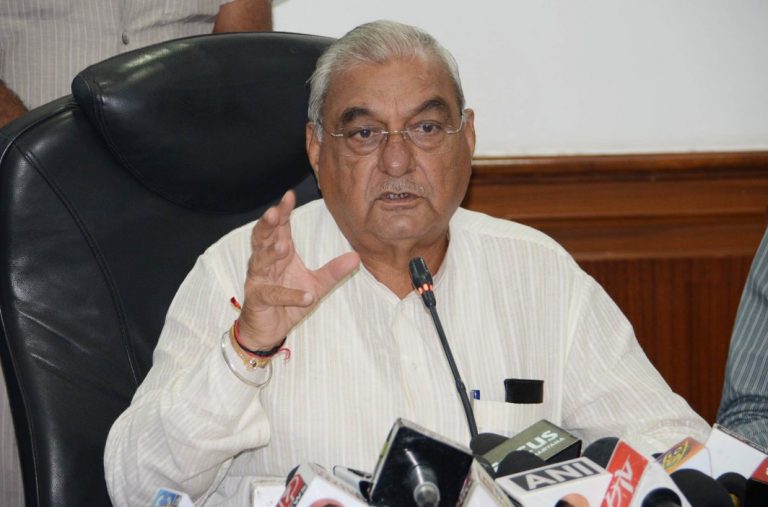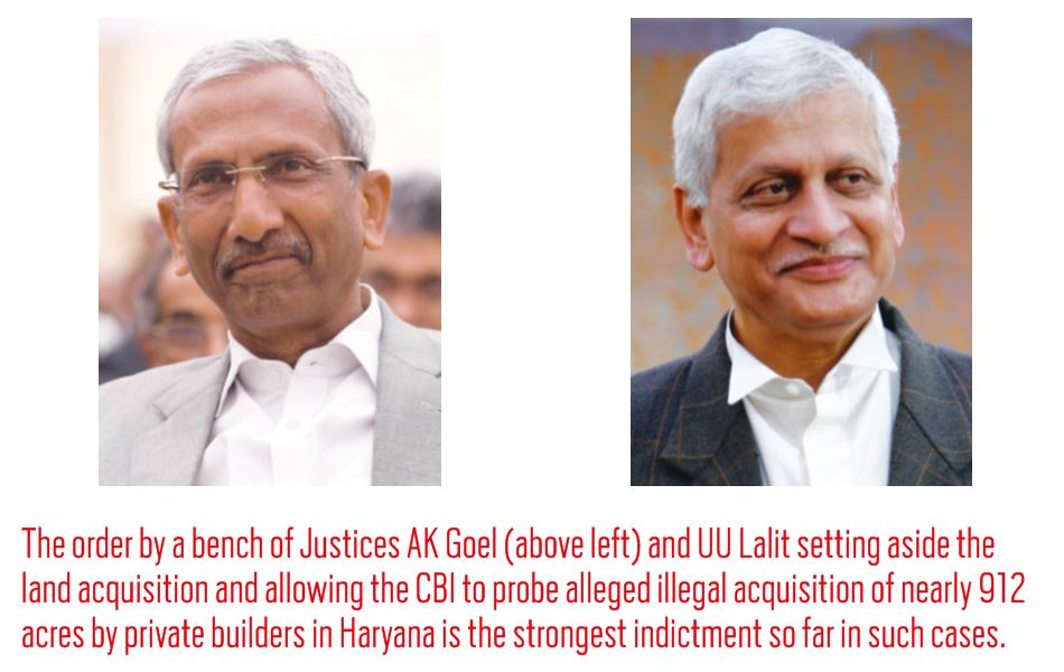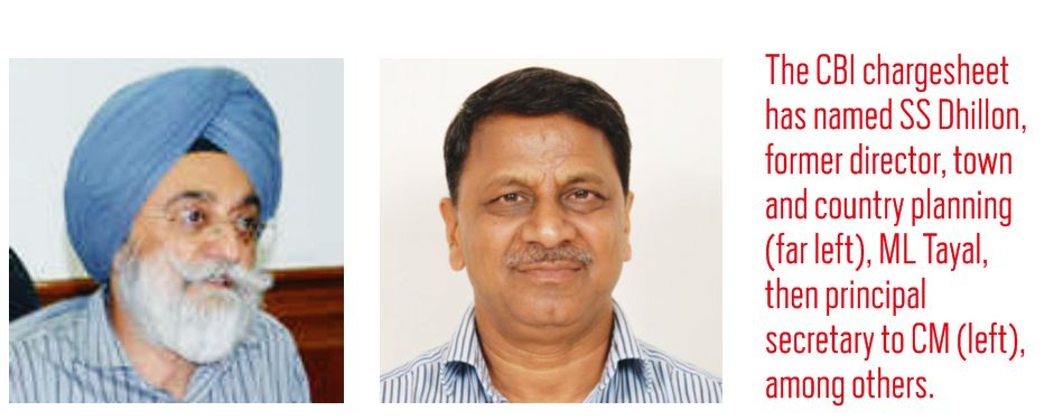
Above: Former Haryana Chief Minister Bhupinder Singh Hooda (file pic)/Photo: UNI
With the apex court coming down hard on the acquisition process by the previous government led by Bhupinder Singh Hooda, he is sinking deeper into legal quicksand
~By Vipin Pubby in Chandigarh
Former Haryana Chief Minister Bhupinder Singh Hooda can no longer claim that allegations of land deals entered into by his government—which allegedly favoured private parties during his tenure—are politically motivated. It is the Supreme Court which is spreading the net around him. In its latest indictment, the apex court bench stated: “It was not a mere bonanza or a deal, but denoted quid pro quo….(land) acquisition order was withdrawn with fraudulent intentions after the land was purchased by the private builders in active connivance with state functionaries.” These strong words were in reference to certain actions taken by the Hooda government while acquiring land from farmers. The process eventually served to enrich builders in Manesar and other parts of the state.
Describing the entire process of land acquisition proceedings as initiated “mala fide intention, illegally and in violation of the provisions of the Land Acquisition Act,” the Court said that these were “nothing but fraud on power” while ordering an inquiry by the Central Bureau of Investigation (CBI). It directed the state and the central governments to “recover every single pie (sic)” and turn it over to the state government.
In its March 12 orders, the bench of Justices AK Goel and UU Lalit said the “exercise of power was guided by considerations extraneous to the provisions of law and, as a matter of fact, was designed to enrich the builders, private entities…..when a custodian of power is influenced in its exercise by considerations outside those for promotion of which the power is vested, such exercise is nothing but colourable (sic) exercise of power and that the power of the state to acquire lands of private persons compulsorily cannot be over stretched to legitimatise a patently illegal and fraudulent exercise undertaken to favour certain private persons”.
The order to set aside the land acquisition and let the CBI investigate the alleged illegal acquisition of land by private builders in Haryana (under a land acquisition process initiated by the Hooda government) is so far the strongest indictment in nearly half a dozen similar cases of land acquisition and release of land to builders. Hooda is already facing investigation in three CBI cases pertaining to land deals.
In the case under scrutiny by the Supreme Court, 912 acres of land were acquired between 2004 and 2007 from three villages—Manesar, Lakhnoula and Naurangpur—to set up an industrial township. After the acquisition was notified, panicky farmers sold land at throwaway prices to private builders. The land, it was pointed out, was initially purchased for around Rs 25 lakh per acre. But as the acquisition process progressed, prices rose to Rs 80 lakh per acre.
However, two days before the compensation award was to be announced in August 2007, the Hooda government cancelled the acquisition. The land was finally purchased by DLF Home Developers Ltd at the rate of Rs 4.5 crore per acre.
The strong words used by the apex court has blunted the oft-repeated stand taken by Hooda and the Congress that the inquiries being conducted by the BJP government led by Manohar Lal Khattar were merely “political vendetta”. Although the cases have to go through scrutiny by the CBI court, the preliminary findings of the Supreme Court are likely to impact the orders of the CBI court.
The modus operandi in almost all such cases was that the government would issue a notification under Section 4 of the Land Acquisition Act, causing panic among the land owners because of the poor compensation ordered by the government. This invariably led land sharks and builders to purchase land from farmers at a throwaway price. For one, the payment was immediate and, second, it was much more than what the government would have released. Inevitably, money would be made by influential people. Then, within a few weeks or months of the notification, the orders were withdrawn and Change of Land Use (CLU) permission, from farm land to commercial or residential land, granted to builders.
In the Manesar land scam, in which the CBI filed a chargesheet earlier this year, it is estimated that the notification led to distress sale of about 400 acres for Rs 100 crore while the de-notification, quickly followed by CLU, boosted the price of that land to at least Rs 1,600 crore.
In other words, the farmers were deprived of around Rs 1,500 crore due to notification and de-notification within 22 days, as per the charge-sheet filed by the CBI against Hooda and 33 others in a special CBI court.
Besides Hooda, the 80,000-page chargesheet has named 33 others including senior bureaucrat ML Tayal, the then principal secretary to the chief minister, Chattar Singh, the then additional PS to the chief minister (later member, UPSC), and SS Dhillon, former director, town and country planning. Then there are 22 companies belonging to private builders. They have been charged under Sections 420, 465, 467, 468, 471 and 120-B of the Indian Penal Code as well as under the Prevention of Corruption Act, 1988.
Besides the CBI, such cases are also being investigated by the Enforcement Directorate, the Haryana Police and its Vigilance Bureau.
The Bureau had already booked Hooda in a case relating to re-allotment of prized land to National Herald at Panchkula in 2005. Senior Congress leaders, including Sonia Gandhi, Rahul Gandhi and Priyanka Gandhi have stakes in the newspaper, which is published by Associated Journals Limited (AJL) and was founded by the first prime minister, Jawaharlal Nehru.
AJL was allotted prime land measuring 3,360 square metres in upmarket Sector 6 of Panchkula in 1982 by the then Congress chief minister, Bhajan Lal. However, the company did not complete construction of the building during the stipulated time-frame despite several reminders and the allotment was cancelled during the regime of Indian National Lok Dal’s Om Parkash Chautala.
Hooda later restored the land to the company, ignoring the opinion of his own advocate general, at a throwaway price.
In another case relating to land deals, the CBI registered an FIR against Hooda in the allotment of 14 industrial plots in Panchkula. The plots were allotted in 2013 to persons who were either related to him or were known to be his close associates. Even the project reports submitted by the applicants were either identical or incomplete.
The Khattar government is also diligently working on what could be one of the most controversial land deal cases. It pertains to a land deal involving Robert Vadra, son-in-law of Sonia Gandhi.
Vadra’s company, Skylight Hospitality, had purchased about three acres of land in Manesar for around Rs 7 crore soon after Hooda had taken over as chief minister of Haryana. It was agricultural land and the company got CLU permission to convert it into land for commercial use. Within a few months, the company sold it to DLF for a whopping Rs 58 crore.
The state government has also recommended a CBI investigation into Rohtak and Sonepat land acquisition and release “scams”. In Sonepat, 885 acres of land were notified to be acquired in 2005 but 300 acres were subsequently released.
Similarly in Rohtak, notification was issued to acquire 850 acres but finally only 441 acres were acquired and the rest released to RK Builders.
With all these cases under investigation or in courts, the law is closing in on Hooda and he might find himself in deep trouble. With the alleged involvement of Vadra, it is now a politically sensitive case where the role of the CBI will also come under intense scrutiny.
However, with the Supreme Court’s sharp observations on land deals, the denouement is certain to be explosive.

